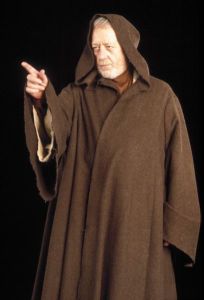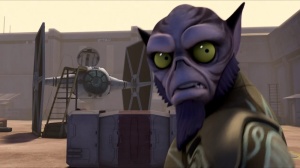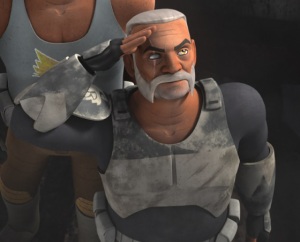Review: Star Wars Rebels: The Lost Commanders
(Quick note: Welcome! Just so you know, this review is not so much a review of the episode, but a look at one or several aspects that I found interesting.)
Star Wars Rebels saw its return last week with its first (or second or third, depending on your philosophical bent) episode of the series, entitled The Lost Commanders. This episode sees the crew of the Ghost seek out some old codgers in the hope of gaining a list of safe harbours. What makes this particular episode stand out, however, is that those old codgers turn out to be none other than Captain Rex, Republic Commando Gregor (if you were drawing a blank, as I did, he’s the Commando who lost his memory and worked as a chef), and Commander Wolffe – characters hopefully well known to viewers of Star Wars: The Clone Wars.
The Best of Both Worlds
But that’s not the only thing that stood out, at least not to me. Another thing that stood out* is that this episode is a very good example of the blending of the meta-story and the standalone story. As I watched, I felt it could essentially be looked upon as a standalone episode; almost all of the episode is dedicated to Gregor and Zeb finding lunch. But that’s not the case. Though the standalone aspect is prominent, it’s framed in the meta-story of the show. (For those unfamiliar with the term, here’s a brief post explaining it). Including part of the meta story in your otherwise standalone story enables it to be connected to all of the episodes, and each episode continues the overall narrative – towards, as that link says, a conclusion. I can only speak personally, but this is the kind of storytelling that I want from the show. Not the micro, but the macro. The story of the galaxy at large, and the almost comforting feeling that the creators have a plan going forward for the show.
*In the interest of fairness, I should note that in the writing of this, I came across this io9 review, which also mentions this aspect.
The first series of Rebels saw a clear delineation between the meta and standalone types of storytelling. Episodes such as Path of the Jedi – and pretty much the entire latter half of the series, come to think of it – were great examples of world-building and mythos expanding. It was, dare I say, universe expanding?

It also saw some admittedly middle of the road one-off episodes. Fun little adventures, like Fighter Flight, that, aside from giving our Spectres some TIE-shaped Chekovian guns for later episodes, as well as character bonding, didn’t really do much to advance the story. Yet for this series, right off the bat, we get some expanded mythos and advancement of the story, alongside some mindless fun.

I’ve spent a good few words saying ‘meta story is great! Yay interconnectedness!’, but haven’t gone into detail about how exactly that applies to this episode, and what it did. Here’s why: there isn’t even that much of it.
Now, partly this is because it’s a two-parter, but to take it out of that context: you don’t really need to include much of the over-arching story to propel it along in any given episode. Don’t get me wrong, those narrative advancement-heavy episodes were great, and I’d love more of that in general, but it doesn’t really need all that much in a standalone episode. Just the brief handful of minutes that we get, that punctuate worm eating and Gregor’s PTSD-addled mind, are all that’s needed to both keep the episode’s story moving, as well as that of the overarching series. And the simple fact that this light touch is there, for me, elevated this mostly one-off episode into something more, and I hope this blending of both worlds is how this series goes forward – because for every standalone is essentially a side-step and I don’t want that. I want every action, every scene to propel the crew and the story forward.
Parralels
This episode also provided some useful parallels between old and hopefully familiar characters, and our new(ish) crew. Zeb and Gregor, Wolffe and Kanan, Rex and – though she doesn’t make much of an appearance – Hera. Though with the latter, there is an interesting divergence in outlook: Rex seems to spend most of his time looking to the past, and through that we get a glimpse into what happened, post Order 66. Yet Hera spends most of her time thinking of – and fighting for – the future. And it is she who is the driving force of the crew, as well as providing the forward momentum for show. (So of course she spends most of the episode in a broken down ship.)

I’ve already mentioned Zeb and Gregor, so let’s look at Wolffe and Kanan. Here are two characters who are the most scarred by their past, and specifically Order 66. In the series 2 TV movie, The Siege of Lothal, Kanan is shown to be the most reticent of the Spectres in joining the wider rebellion, preferring to provide small instances of aid to people in need. And though he starts off this episode being amiable enough, he’s more than ready to wreck the mission as soon as he realises the people he’s meant to meet are clones – the very people who turned on his master. And, well, he’s not exactly a big help thereafter.
Then there’s Wolffe. A man who fires on Kanan just for being a Jedi. And more: he actively cuts Rex’s ties to Ahsoka and the fledgeling rebellion beforehand, and informs the Empire of the presence of a Jedi at their location. Thanks a bunch, Wolffe.

Yet that’s not entirely fair. Wolffe is also grievously suffering from Order 66 in his own way. His mental scarring may not be as obvious as Gregor’s, but examining his actions show that his own mental problems are all too transparent. It’s seen in how he exclaims, as he fires upon Kanan, that he believes the Jedi has come for revenge – he believes this despite all (admittedly scant) previous evidence. It’s in how he expresses tangible fear that the Empire will come for them, because of the Jedi, and ultimately betrays his allies. Though it’s said that none of these clones turned on ‘their Jedi’, Wolffe still feels the guilt from that act and it’s hounded him all these years later. Though fiction, I’m astonished and pleased with this more nuanced display of mental anguish. Gregor may be the ‘cooky uncle’ kind of mentally unbalanced (and I do wish they hadn’t played to that stereotype) and thus the more easily empathized with, but Wolffe provides the sort of mental trauma that I can identify with.
Reference
Lastly, I want to mention something not as positive. I’ve been a fan of The Clone Wars TV series since the beginning, and have seen every episode. Despite this, I couldn’t for the life of me recall who Gregor was. And other fans, who have also followed the TCW series, had absolutely no clue who Wolffe was. My sister, who is not a Star Wars fan, yet I somehow managed to convince to watch the entirety of Rebels (and even watched this episode, on her own, and without prompting. Not a Star Wars fan my eye.) had no clue who Ahsoka was, as she climbed down the ladder at the end of series 1, did not bat an eyelash at the appearance of any of the clones, and probably won’t care who the bounty hunter, Cad Bane, is, when he turns up in a later episode.
I’m starting to worry that this show may begin to lean too heavily on what’s come before. That may seem silly considering it’s based heavily on the movies, but that’s the movies, not a TV show that the average viewer may not have even seen.
Though I may worry about this, I hope, and do think it reasonable to believe, that any more references to come will be well handled, for the benefit of said average viewer, by establishing their in-universe cred as they appear, and not rely on nostalgia for a TV series that ended … er … a couple of years ago. That’s old enough for nostalgia, right?
Author: Michael Dare
Michael Dare is a writer, lives in the UK, and has been slowly coming to terms with the realization that he is not Sherlock, but Watson. He loves Star Wars, dislikes blue milk. Enjoys jumping sharks. Survives on the tears of sexist men, and cheeseburgers.

